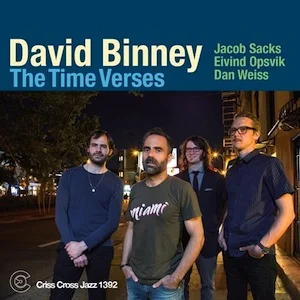Label: Criss Cross Jazz, 2022
Personnel - David Binney: alto saxophone; Craig Taborn: piano; Eivind Opsvik; bass; Dan Weiss: drums.
The David Binney Quartet returns with lots of color on A Glimpse of the Eternal, a 13-track album featuring originals, covers, and three solo interludes (two for piano and one for saxophone). By comparison with the quartet's previous outing - Time Verses (2017) - we have the intrepid pianist Craig Taborn, a long-time collaborator, occupying the piano chair that belonged to Jacob Sacks. The core of the rhythm section remains assigned to bassist Eivind Opsvik and drummer Dan Weiss.
The album’s first three tracks are fluttering, breathy pieces delivered with a great deal of subtlety - “Our Place” is one of Binney’s new compositions, flowing with a straight eight feel and gentle traction; “In a Way”, which was penned by the L.A.-born pianist Michael Cain, keeps the relaxing tones; while “Ambivalence”, one of the two pieces borrowed from the repertoire of composer/arranger Vince Mendoza, is a fine ballad that, mellowing the mood through impeccable brushwork, is elevated by Binney’s high-emotional statement and Taborn’s exquisite accompaniment.
This relative simplicity is converted into functional complexity on the fourth track, “Vibe Changer”, whose defiant rock posture and spasmodic gestures force the soloists to become brisker in nature. The impetus eases again with Jan Garbarek’s “Blue Sky”, a picturesque title built with an optimistic melody and crescent cross-stick syncopation. Yet, it's with the beautiful take on Ralph Towner’s folksy “Nightfall” that the group reaches a peak. A strange combination of tense and easygoing forces arises from the arco pedal and firm drumming, and then Binney and Taborn stun. The former transcends with his sinuous outside-in playing, whereas the latter deconstructs and reinvents via ingenious piano acrobatics.
Equally curious yet distinct, the title track presents an intriguing first part that leads to a slow singable waltz whose texture and tempo shift along the way. The album ends with a totally different vibe as a consequence of a blazing interpretation of “I Had the Craziest Dream”, a jazz standard. Here, the saxophonist blows a mile a minute, but the result is not as great as on other occasions. Overall, this is a strong album that solidifies Binney’s stature as a major player.
Favorite Tracks:
03 - Ambivalence ► 04 - Vibe Changer ► 07 - Nightfall






